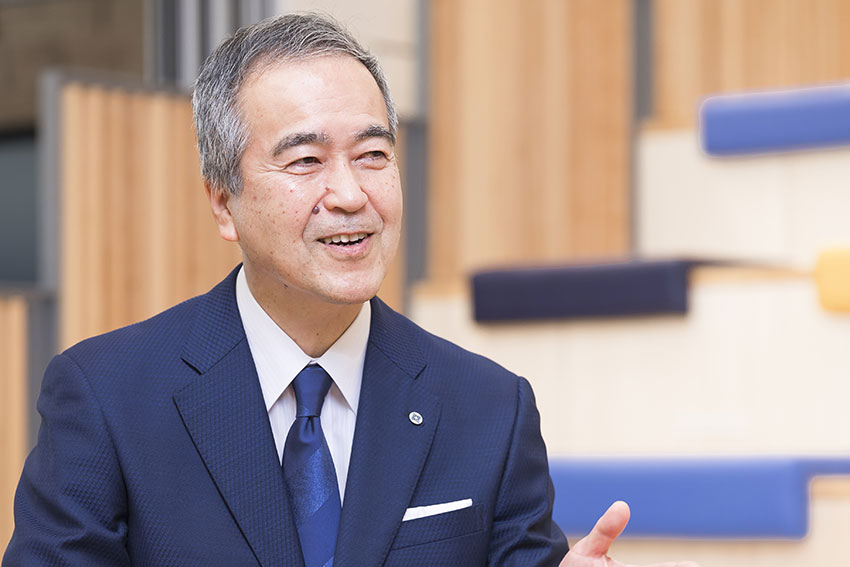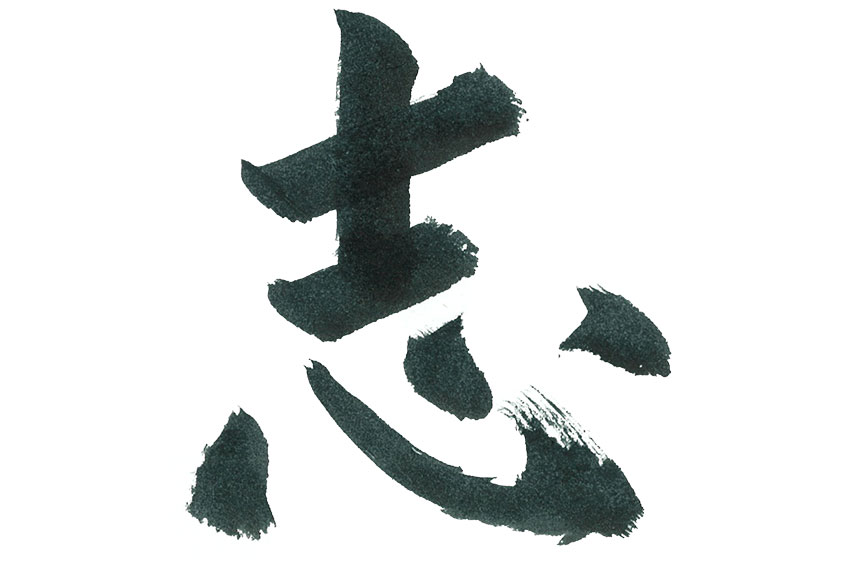Kanazawa University is embracing its rich history and global vision by driving research excellence, fostering international partnerships, and creating new opportunities for both local and international students. With a strong focus on diversity, digital transformation, and ethical entrepreneurship, the university is preparing future leaders to tackle global challenges.

One of the main challenges that Japan faces is a declining population. This could create a shortfall of workers in the economy. It’s forecasted that by 2040, Japan could face a shortage of over 10 million workers. What role do you think universities, as the highest academic institution, should play in this situation?
Population decline is certainly a major problem facing Japan. On the other hand, the role of universities is essentially to nurture creative and diverse human resources and send them out into society. Kanazawa University also emphasized this diversity and promoted internationalization, diversity, equity, and inclusion. Today, "global is norm" and interactions among people of various backgrounds are realized throughout the campus. We believe that our focus on diversity will lead to the globalization and even creative development of Japanese society.
In January 2024, there was a huge earthquake in the Noto Peninsula area. First of all, I would like to express my condolences to those who lost their lives in the 2024 Noto Peninsula Earthquake and my deepest sympathies to all those who were affected by the disaster. The Noto region is a depopulated area that truly symbolizes the population problems facing Japan. Even before the earthquake, Kanazawa University had been working with the people of Noto on various initiatives to revitalize the region. In order to recover from the earthquake and to create a sustainable future, Kanazawa University has established a new center called Noto Resilience and Revitalization Center. The regional revitalization activities undertaken by this center will serve as a new model not only for Japan, but for the world.
In 2022, before the earthquake, you established a School of Tourism Sciences and Design with the aim to bolster this area as a leading tourist destination. Given the effects of the terrible earthquake, do you see this school and this goal as being even more important now?
Yes, the founding philosophy of the School of Tourism Sciences and Design is to create new tourism values and to transform the ecosystem based on scientific viewpoints of a new tourism science. We will not only use tourism resources, but also work on digital technology through a fusion of the humanities and sciences. Noto has been and will continue to be an important co-creation partner and research field. The Noto Peninsula has a variety of natural tourism resources, and fascinating people and their lives and culture. We hope that the School of Tourism Sciences and Design will play a major role in preserving Noto's traditions and creating a new future value.
You mentioned you want to have greater success in attracting people to the area. I think when you look at international students, Kanazawa University has been particularly successful in that regard. Japan should be a very attractive place for international students. It has excellent facilities and there’s the ability for students to study in English, but when you look at the national figures, the average is just 5% of international students. You compare this to the United Kingdom, it’s about 20%, Australia is about 30%. We spoke to other presidents that have said they’re aiming to get to just 3%. When we look at the number of international students you have here, it’s about 8%. What sort of changes do you think other universities need to make to have the same success in attracting students that you have had here?
There are at least two reasons why we have been able to attract a significant percentage of international students: first, the high level of advanced research, and second, the uniqueness of the region. Kanazawa University has seven flagship research institutes, including the Nano Life Science Institute, each of which disseminates world-leading research achievements. The official language of this institute is English. In terms of the region, Ishikawa is known for its rich history and traditions combined with modern culture. International students are able to experience traditional Japanese culture in a modern and sophisticated environment at the same time. Kanazawa University has a very extensive support system for international students, including families, and cultural experience programs, which are some of the major factors that attract international students.
When we talk about international students, one criticism that has been leveled against the Japanese system is the difficulty that some international students have in finding employment afterwards. Some have said this is due to a lack of support from the universities or a difficulty in trying to navigate the job market here in Japan. Could you talk a bit about the success that some of your international students might have had and what kind of support you have in place for helping international students who want to work in Japan after finishing their studies?
Today, many Japanese companies are globalizing their operations, and our university has received many job offers from those global companies. Kanazawa University has been operating a program called “Link KAGAYAKI” to promote international students to work in Japan especially in Hokuriku area. Through various events offered by the program, such as joint company information sessions and company tours, international students are able to meet and get to know a lot of local excellent companies, and some students find jobs there. Learning the Japanese language is certainly a major challenge, but Kanazawa University also has special classes that provide Japanese language education for students, including their families, to provide the utmost support. Kanazawa University has been adopted by " Project for Developing Centers for Promoting Japanese Language Teacher Training" supervised by the Ministry of Education, Culture, Sports, Science and Technology.We have a dormitory where Japanese and international students live together, so this creates more of an international community within the campus and it’s part of their daily lives. We also provide many programs to help them acclimate to living in Japan.
Another area that’s becoming very important in the field of education is the integration of new technologies. Digital transformation (DX) and artificial intelligence (AI) are becoming very important, and also the idea of creating lifelong learning. As these technologies advance, it’s necessary for reskilling and upskilling. You recently added a “Thrive in the Future” standard to your Kanazawa University “Global” Standards (KUGS). What role do you see the integration of this new technology having in your teaching at the university?
Digital skills are essential for the future leaders of our society. In light of this, Kanazawa University has newly added " Thrive in the future " as the sixth indicator of KUGS (Kanazawa University “Global” Standard). In addition, Kanazawa University has developed a university-wide data science special program to automatically "visualize" the acquisition status of data science-related subjects for all undergraduate students. Digital skills are also in line with the demand for recurrent and reskilling as you have asked. Digital human resources with advanced mastery of AI, IoT, etc. are increasingly in demand. We will respond to this social demand by increasing the number of students enrolled in the School of Smart Technology and Innovation, College of Transdisciplinary Sciences for Innovation and the School of Electrical, Information and Communication Engineering, College of Science and Engineering from the 2024 academic year.
Research is one of the strengths of Kanazawa University. You had said that you want to establish a top tier research center led by your flagship institutes such as the Nano Life Science Institute (WPI-NanoLSI), to address global issues in areas that haven’t been so deeply explored before. You also want to use your vast campus to facilitate innovation and partnerships beyond academia with different stakeholders. What sort of structures and processes have you implemented to ensure effective collaboration to translate your research into real world benefits?

Led by WPI-NanoLSI, our university has seven flagship research institutes, each of which conducts its own advanced research. For example, the Cancer Research Institute is the only institute among Japan's national universities that specializes in cancer research. In addition, as a center for industry-academia collaboration, the Biomass Green Innovation Center was constructed in April 2023, linking university research with industry. Furthermore, a new center is currently under construction that will bridge university’s fundamental research with practical social applications and start-ups. Here, we have also established Vision Incubate Co., Ltd., the first venture capital company wholly owned by a national university. In other words, we have created an integrated scheme that seamlessly links basic research, applied research, and entrepreneurship. Having a venture capital company means that the university can discover and support the seeds of entrepreneurship from a very early phase closer to fundamental research. We are strongly promoting the use of the entire university as a field for empirical research, taking advantage of the top level fundamental research and the university's vast campus.
Vision Incubate Co., Ltd. differs a lot from the usual model at the universities we follow in seeking funding. Of course, it also brings up some challenges of how to navigate the complexities of venture capital while also trying to align your academic goals with commercial viability. Could you talk about the advantages and challenges of having your own venture capital as a funding source?
A major benefit of a university having a VC is the increased exposure to the entrepreneurial spirit by the faculty, and by the students. This is a great incentive for the university as an educational research institution. The presence of a VC at a university allows for the development of and support for entrepreneurship from the very early stages of basic research, and Vision Incubate Co., Ltd. has some of the best and brightest staff to do so.
As challenges to overcome, the exit success rate for startups is said to be low. On the other hand, university-launched ventures are said to perform particularly well among them. The university believes that it is important to establish a more adequate follow-up system in the future.
One of the interesting comments with the huge investment in the Nikkei 225 was that many foreigners cited the fact that corporate governance reform was something that made them comfortable to finally park their money in Japanese companies. They felt safer to do so than in years gone by. Is higher level education helping to sow the seeds of more ethical entrepreneurship?
As an institution of higher education, Kanazawa University values diversity and continues to pursue its responsibilities as a citizen with regard to environmental and various social issues. We believe that this education will also provide start-ups with a high sense of ethics and international cooperation. Especially in advanced research, such as artificial intelligence, the social impact of new technologies must also be deeply considered. Kanazawa University is committed to an ethical, legal, and social issues (ELSI) framework, which includes international intellectual property management and fostering ethical entrepreneurship. Our future vision, "Contribution to Society through Future-oriented Intelligence," includes this spirit.
I want to ask about internationalization here at the university. You have engaged in your Top Global University Project and this saw big increases in the undergraduate courses offered in English, the English proficiency of your students, and a big increase in international students who come here to study. But this is not only true for international students. The number of foreign and postgraduate degrees held by your staff also has increased significantly. What sort of strategies have you employed to upskill and increase the number of degrees among your staff?
During the 10 years of the Top Global University Project supervised by the Ministry of Education, Culture, Sports, Science and Technology, we have worked to internationalize not only our students but also our faculty. Most of the organizations have implemented international faculty recruitment. In addition, we have succeeded in attracting many outstanding international researchers and faculty members as a result of various other efforts, such as the establishment of educational programs that allow students to graduate only in English, the use of English for internal university documents, and support programs for the families of international researchers.
Obviously, there’s a necessity to globalize and internationalize, and you talked before about the important culture here in the region and also at the university. With this necessity to globalize, how do you maintain the cultural identity that makes the university Japanese while still opening your doors to international staff and students?
We have common values that are unchanging and we are adding an international element to it. These two elements are not in conflict; they’re actually merging and even creating a synergistic effect, where one plus one becomes three, resulting in a win-win effect. An example of this is foreign students and Japanese students learning about Japanese culture together. Through that, Japanese students can also get a clearer understanding of their own culture, which sometimes may go unnoticed. Kanazawa is an area rich in history and Japanese cultural tradition, so we want to fully leverage our environment to provide these educational opportunities to all our students. this year, we established Kanazawa University International Research Center for Japan Studies which focuses on Japanese culture, international culture, and the connections between the two.
Kanazawa University dates back to 1862 as an institution for smallpox vaccination. Your first graduate school opened in 1955 and now you’ve grown into a leading national university. Could you talk about some of the greatest milestones in the history of the university?
As you say, our university has a long history and tradition dating back to 1862. Since it was established as a Kaga Domain’s Hikoso Vaccination Center, its fundamental philosophy has been to contribute to society. Even after several predecessor schools including the fourth Higher School, were merged to form a national university, this spirit has been handed down from generation to generation. The Kanazawa University Charter states Kanazawa University is “a research university dedicated to education, while opening up its doors to both local and global society.” In the long history of Kanazawa University, the most significant event as a research university may be the Nano Life Science Institute (WPI-NanoLSI), which was adopted as World Premier International Research Center Initiative (WPI) by the Ministry of Education, Culture, Sports, Science and Technology. This institute has developed a unique scanning probe microscopy technology to observe living cells, and since its establishment has continued to produce research results that have had a major impact worldwide. We believe that the " Nanoendoscopy", a cellular endoscope developed by WPI-NanoLSI is a tool that will revolutionize science and medicine.
Throughout your history, you’ve been able to partner with different universities. You have over 300 partner universities around the world. You’ve also set out your goals towards the realization of the global campus. Are there any plans to expand your international partnerships in the coming years, and if so, are there any regions in particular which you have identified?
We are actively seeking new partnerships to create joint degree programs and enhance international research. We have 30 overseas liaison offices, with our most recent addition located at the Mongolian National University of Medical Sciences. We aim to establish even more of these offices.
If we were to come back to interview you on the last day of your presidency, what would you like to have achieved by that date?

In April 2022, when I assumed the position of President, we summarized our vision for the future of Kanazawa University as "Kokorozashi" (aspiration). These "aspirations" point to a vision for the future of Kanazawa University in terms of research, education, and administration. What should we do to realize this vision? Today, too, I had nice discussions with students. As a world-leading research university, it should have multiple international research centers followingthe Nano Life Science Institute (WPI-NanoLSI) . Kanazawa University should be trusted by all stakeholders through its contribution to society with future-oriented knowledge, and should be a university where people are nurtured and people shine. To realize these goals, we will continue to take on new challenges.
0 COMMENTS